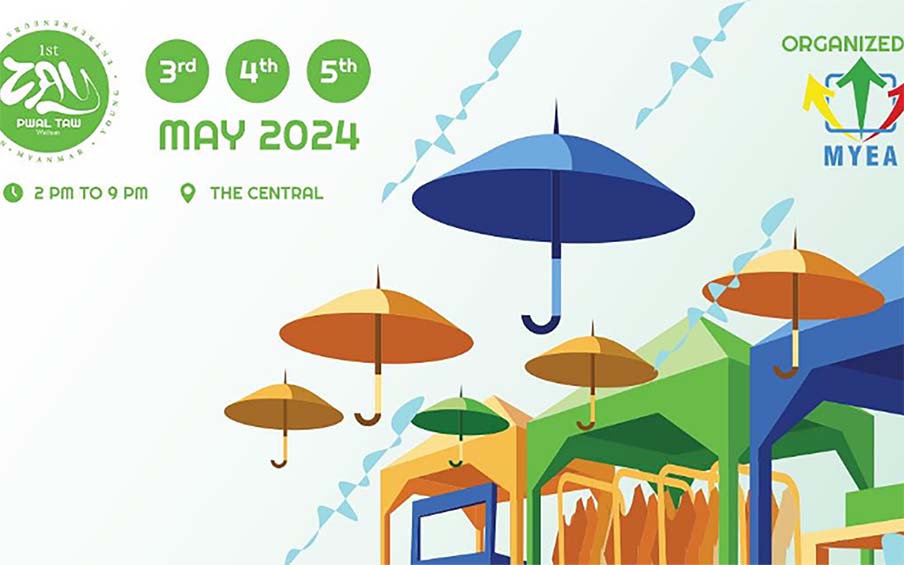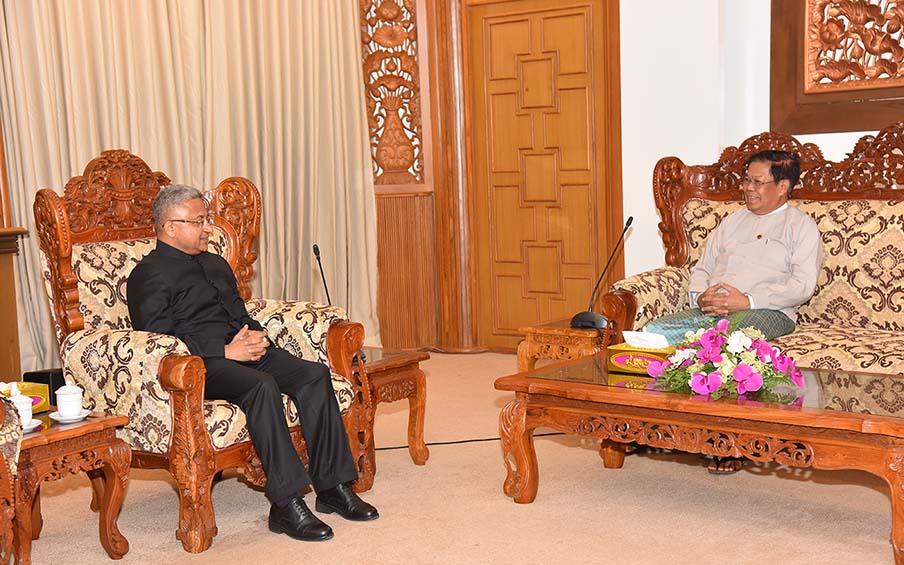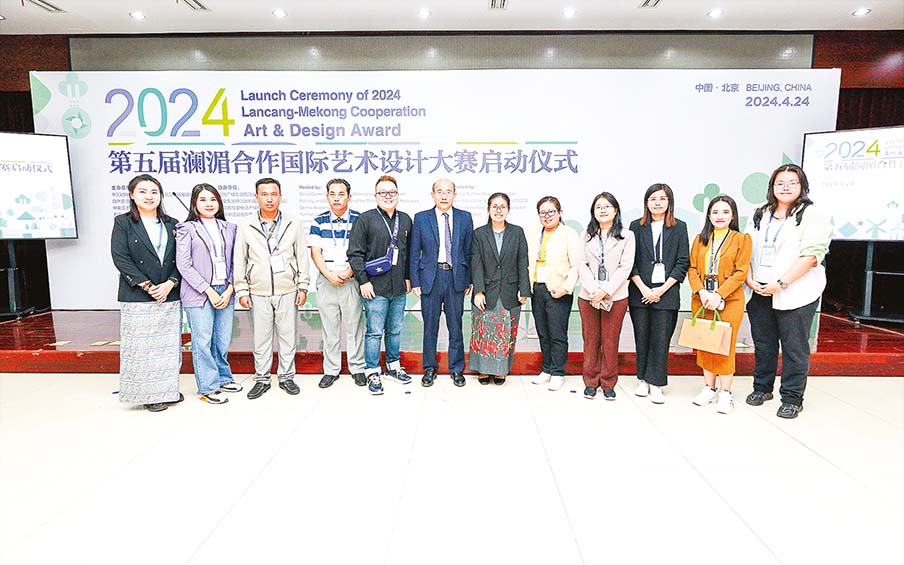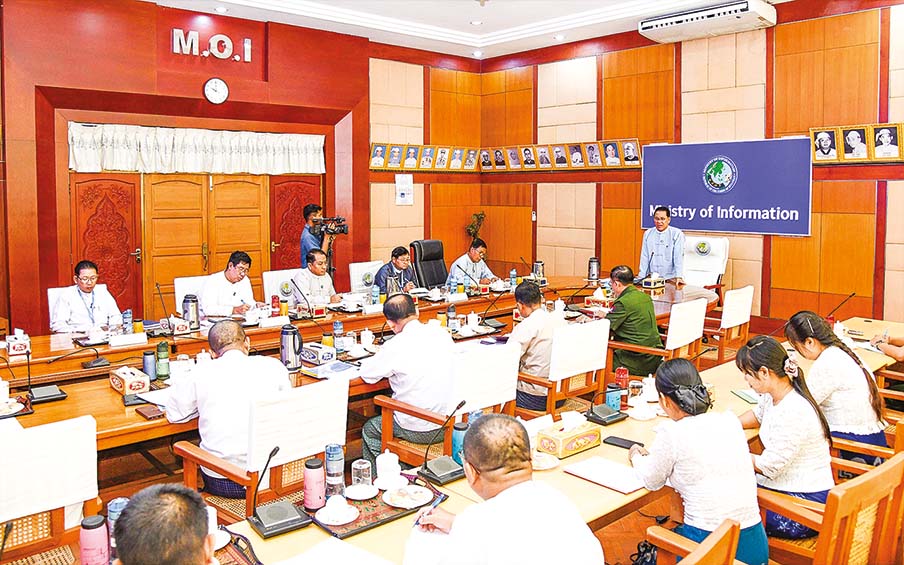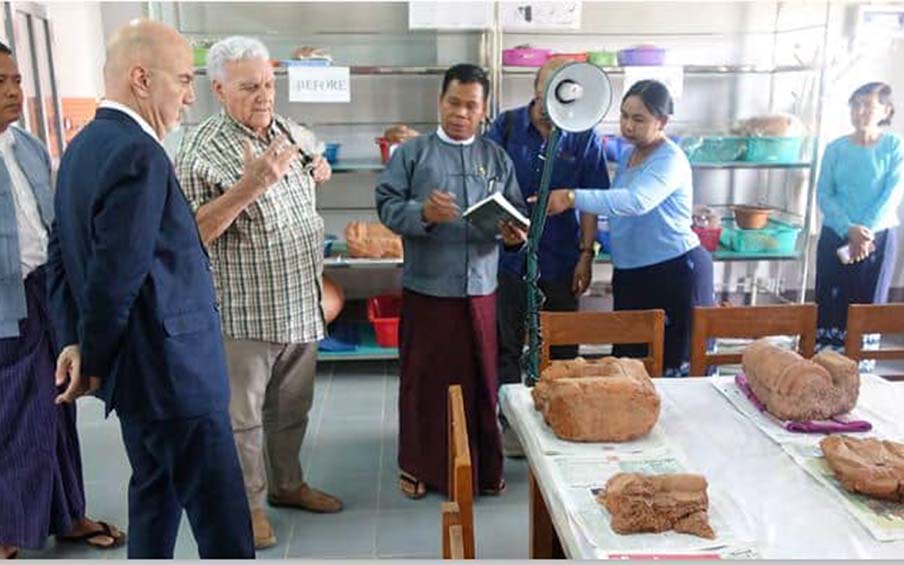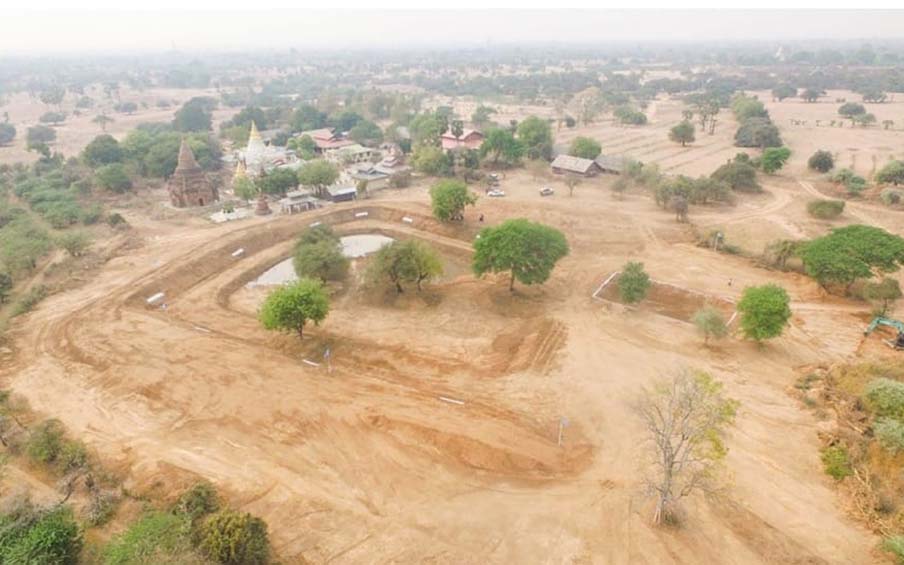I DIOMS and expressions are really important in everyday talk. They give us a peek into different cultures and make language more interesting. They help us create strong connections with others and make conversations stick in our minds.
Using idioms makes our language more colourful and diverse, and it helps us understand other cultures better, making it easier to talk to people from different backgrounds.
When we talk to each other, it’s like we’re dancing with words, bringing us closer and helping us understand each other better.
Language helps us connect with others, express ourselves, and share our thoughts and feelings. It’s like a pathway that brings people together, helping us all go on this journey of life together.
လက်ဖျားခါ
(lakhpya:hka)
• အလွန်အမင်းအံ့ဩသည်။
• ဥပမာ – ဥရောပတိုက်သားတို့ပင် လက်ဖျားခါ၍ အံ့ဩကြရသည်။
အထင်ကြီးလောက်သော အောင်မြင်မှုတစ်ခုကို တွေ့ကြုံရသောအခါတွင် အံ့သြစွာ ငေးကြည့်ခြင်း သို့မဟုတ် အလိုလို လက်ကို မြှောက်ကာ လက်ချောင်းထိပ်များကို လှုပ် ယမ်းခြင်းဖြင့် ၎င်းတို့၏ အံ့သြမှုကို ဖော်ပြလေ့ရှိသည်။
“လက်ဖျားခါခြင်း” ဟူသော စကားစုသည် အံ့အားသင့်မှုကို ပြသခြင်းနှင့် အဓိပ္ပါယ်တူသည်။
• To shake off the fingertips
DEFINITION
In Myanmar, when individuals witness an impressive achievement, they commonly express their awe by either gazing in wonder or spontaneously raising their hands and shaking their fingertips. Hence, the phrase “shaking the fingertips” is synonymous with showing amazement.
• In English, when people witness an impressive accomplishment, they might express their awe by saying, “Wow!” or “Bravo!” Similarly, the phrase “jaw-dropping moment” is synonymous with showing amazement.
Here are the expanded versions:
“Knock one’s socks off”
Definition: To greatly impress or astonish someone.
Example: Her performance on stage really knocked our socks off; we were all speechless.
“Blow someone away.”
Definition: To impress or overwhelm someone with amazement.
Example: The beauty of the landscape blew me away; I had never seen anything like it before.
“Drop one’s jaw.”
Definition: To react with astonishment or disbelief.
Example: When she revealed her hidden talent, everyone in the room dropped their jaws in amazement.
“Leave someone speechless.”
Definition: To amaze or astonish someone to the point where they cannot articulate a response.
Example: The magician’s trick left the entire audience speechless; nobody could figure out how he did it.
“Take one’s breath away.”
Definition: To amaze or astonish someone so profoundly that it feels as if their breath is momentarily taken away.
Example: The view from the mountaintop took my breath away; it was absolutely breathtaking.
“Stop someone in their tracks.”
Definition: To cause someone to pause abruptly due to shock or amazement.
Example: His incredible singing voice stopped me in my tracks; I couldn’t believe how talented he was.
“Raise eyebrows”
Definition: To cause surprise, scepticism, or disapproval.
Example: Her daring fashion choice raised eyebrows at the formal event, but she confidently rocked the look.
“Turn heads”
Definition: To attract attention due to being impressive or striking.
Example: The new sports car turned heads as it zoomed down the street; everyone stopped to admire it.
“Light up the room”
Definition: To impress or captivate everyone in a space with one’s presence or actions.
Example: His infectious laughter and cheerful demeanour lit up the room wherever he went.
“Take the cake.”
Definition: To be the most impressive or outstanding among a group.
Example: Her flawless performance indeed took the cake at the talent show; everyone agreed she was the best.
အကျကောက်
(a.kya.kauk)
• စာ၊ စကားစသည်တို့၏ သဘောအဓိပ္ပာယ်ကို မိမိလိုရာသို့ဆွဲ၍ တလွဲကောက်ယူသည်။
ဥပမာ — ဒီကအကောင်းပြောမှ သူက အကျကောက်ရသေးတယ်။
• အငြင်းအခုံရှိသော နားထောင်သူသည် စကားလုံးကို ကွဲပြားစွာ အဓိပ္ပာယ်ဖွင့်ဆိုနိုင်ပြီး စကားပြောသူအား အမှားဟု သတ်မှတ်နိုင်သည်။
• တမင်တကာ လွဲမှားစွာ အဓိပ္ပာယ်ဖွင့်ဆိုခြင်းကို “အကျကောက် ခြင်း” ဟု သတ်မှတ်နိုင်သည်။
ကြောင်းတူသံကွဲ
• အထအနကောက်
• Take literal meaning; interpretation of the exact word to the letter rather than figuratively.
• To pick up what has fallen on the wrong side.
MEANING
Occasionally, using a word from Myanmar can unintentionally alter the intended meaning for a speaker. Since certain words have multiple meanings, the context usually clarifies the intended sense. Nevertheless, a contentious listener might interpret the word differently and attribute fault to the speaker. This deliberate misinterpretation is referred to as “picking up what has fallen on the wrong side.”
Here are the expanded versions:
“Reading between the lines”
– Inferring meaning that isn’t explicitly stated. Example: She’s always reading between the lines and assuming the worst.
“Twisting someone’s words”
– Distorting or misinterpreting what someone says. Example: I hate it when people twist my words and make me out to be the bad guy.
“Putting words in someone’s mouth”
– Falsely attributing statements to someone.
Example: Stop putting words in my mouth! I never said I agreed with you.
“Hearing what you want to hear.”
– Interpreting information in a way that confirms your preconceptions or desires.
Example: Don’t just hear what you want to hear; listen to what’s actually being said.
“Taking something out of context”
– Misunderstanding due to not considering the surrounding information.
Example: You’re taking my comment entirely out of context. You need to consider what I said before and after.
“Lost in translation”
– Misunderstanding or misinterpretation due to language differences.
Example: The joke didn’t translate well into English; it’s one of those things that gets lost in translation.
“Barking up the wrong tree”
– Pursuing a mistaken or misguided course of action.
Example: If you think I’m the one who took your keys, you’re barking up the wrong tree. I haven’t left my desk all day.
“Jumping to conclusions”
– Forming opinions or making decisions hastily without all the facts.
Example: Don’t jump to conclusions about why she’s upset. There could be many reasons.
“Seeing things through rose-coloured glasses”
– Having an overly optimistic or idealized perspective.
Example: You see the situation through rose-coloured glasses if you think everything will work out perfectly.
“Getting the wrong end of the stick”
– Misunderstanding or misinterpreting a situation.
Example: I think you’ve got the wrong end of the stick. Let me explain what I really meant.
အရူးလွယ်အိတ်
(a.ru:lwaiit)
တွေ့ကရာ ပေါက်ကရ ပစ္စည်းမျိုးစုံ ထည့်ထားသောအိတ်။
ခိုင်းနှိုင်းရာ၌ သုံးသည်။
ဥပမာ — မင်းရဲ့အိတ်ကလည်း အရူးလွယ်အိတ် ကျနေတာပဲ။
• grab-bag; miscellany; odds and ends.
DEFINITION
Someone who is not very wise may collect lots of different things they like as they go about their day. They might put these things in a bag they carry over their shoulder. This bag ends up holding all sorts of stuff, from little gadgets to random bits and bobs.
Similarly, a person who learns a lot about many different things is sometimes compared to a “fool’s bag” or a “sling-bag of a fool.” This means their mind is like a bag full of all kinds of knowledge. Just as you can pull things out of a bag, others can learn from this person’s wide range of knowledge on different topics.
Here are the expanded versions:
• “Jack of all trades, master of none”
• “A person who dabbles in many things but doesn’t specialize in any is often termed as a ‘jack of all trades, master of none’.”
• “A rolling stone gathers no moss.”
• “Someone constantly on the move, never settling in one place or profession, is said to be like a ‘rolling stone, gathering no moss’.”
• “One man’s trash is another man’s treasure.”
• “The notion that what may be deemed worthless by one can hold great value for another is captured in the saying, ‘one man’s trash is another man’s treasure’.”
• “A mind like a sponge”
• “A person with an insatiable appetite for learning and absorbing new information is often described as having ‘a mind like a sponge’.”
• “A library of knowledge”
• “Someone who possesses a vast reservoir of information across diverse subjects can be likened to ‘a walking library of knowledge’.”
• “A wealth of information”
• “Individuals who have amassed a significant amount of valuable knowledge are often referred to as being ‘a treasure trove of information’.”
• “A Renaissance man/woman”
• “Those who exhibit mastery and versatility in numerous fields, much like the polymaths of the Renaissance era, are often hailed as ‘modern Renaissance men or women’.”
Each of these variations captures the essence of the original text, depicting individuals who possess a wide range of knowledge or interests.
EXAMPLES
Example: “He’s always travelling and trying new jobs; he’s like a rolling stone, gathering no moss.”
“One man’s trash is another man’s treasure” This saying implies that what one person considers worthless may be highly valued by someone else.
Example: “She collects old books and antiques; as they say, ‘one man’s trash is another man’s treasure.’”
“A mind like a sponge”: This phrase describes someone who absorbs information or knowledge quickly and eagerly.
Example: “She’s always reading and learning new things; she has a mind like a sponge.”
“A library of knowledge”: This expression refers to someone who has a vast amount of information or expertise on various subjects.
Example: “With his years of experience and extensive reading, he’s become a walking library of knowledge.”
“A wealth of information”: This phrase describes someone who possesses a large amount of valuable knowledge.
Example: “She’s been studying history for years; she’s a wealth of information on the subject.”
“A Renaissance man/woman”: This term refers to someone who is knowledgeable and skilled in many different areas, similar to the polymaths of the Renaissance period.
Example: “He’s not only an excellent musician but also a skilled painter and writer; he’s a true Renaissance man.”
SOURCES:
• မြ န် မာ စာလုံး ပေါ င်း သတ် ပုံ ကျ မ်း (မြန်မာစာအဖွဲ့၊ ၂၀၀၃ ခုနှစ်)
• Myanmar Idioms, written by Saya Hla Thamein
• THEIDIOMS.COM
• MMPROVERBS.PRO








